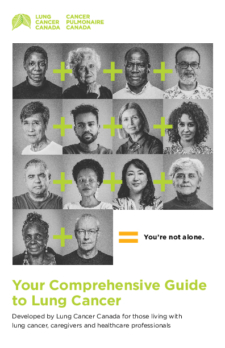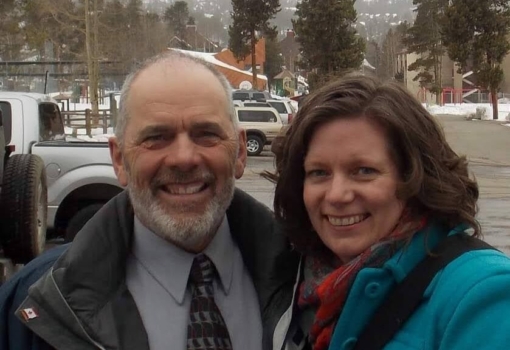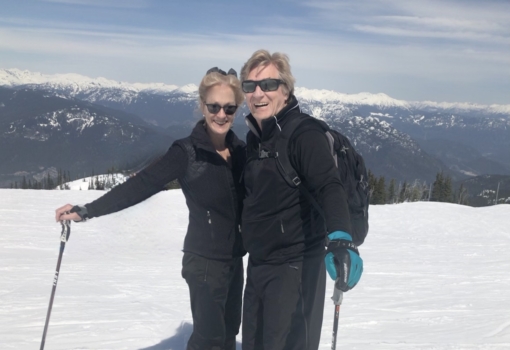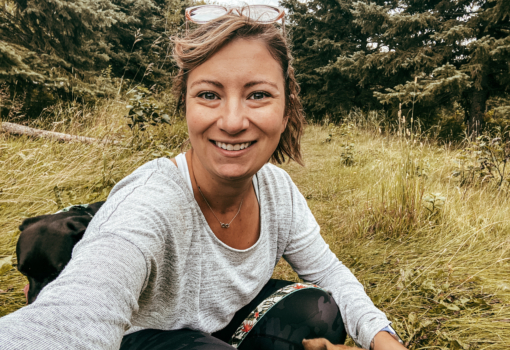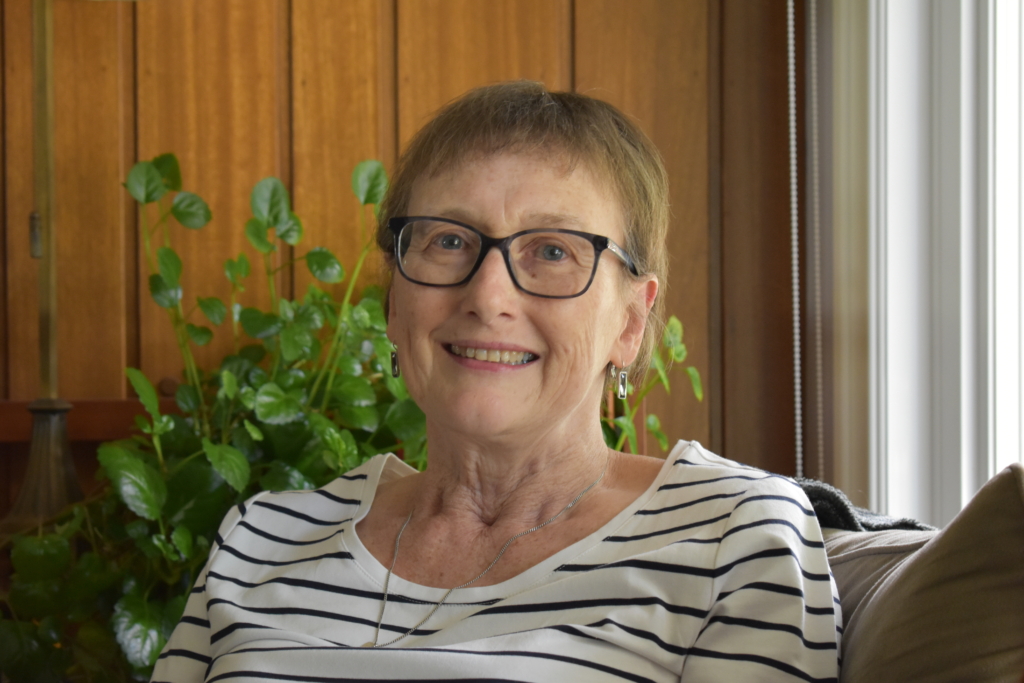
It all started in August 2014, when I went for my annual physical. I was 56 years old, feeling well, working full time, active, running 5k’s and busy living a normal life. I had no signs or symptoms of anything, but my family doctor (GP) decided to take a chest x-ray. He then called me and said he needs more views, and subsequently I went for a CT-scan in September2014. My GP called me to come in for the results and he told me that I had lung cancer! This was devasting news as I had never smoked. He went on to say that he would refer me to a thoracic surgeon. I considered myself fortunate because I was a medical social worker at the hospital where the thoracic surgeon worked, and he was someone I had previously worked with. It made me very comfortable that my health care team included people that I already knew in a professional capacity.
I had a mediastinotomy in October and a lymph node that had shown up on the CT scan was biopsied. The biopsy was sent off to pathology and a few weeks later the results showed it was Stage 3 lung cancer, that was eventually classified as having the ALK mutation. When we looked into what may have caused my lung cancer diagnosis, we tested the house for radon. The house was built in 1969 and the Becquerel reading on the main floor, after 3 months of testing, read over 400, with the finished basement reading over 700. That was higher than the Health Canada recommendations of less than 200 Becquerels as being a safe level so we subsequently had it mitigated.
The nest step was a referral to CancerCare Manitoba (CCMB), which was fortunate as it was adjacent to the hospital I was working at. I shared my situation with my boss, who was very supportive and accommodating to my medical needs, which was a great help. My personal style of dealing with my cancer diagnosis was to tell anyone that would listen, especially with doctors, nurses and social workers that I worked with.
I had chemotherapy and radiation at the same time, 25 treatments of radiation and 2 weeks of chemotherapy, one week at the beginning and one week at the end of radiation. While I was on chemotherapy, I was fully independent, however, I stopped going to the gym and running outdoors. The CT a few weeks later showed that the treatments had a minimal effect, and basically the cancer had not changed. I was then referred to a different surgeon, because my original surgeon had retired, and he decided to perform a left upper lobectomy and extensive lymph node resection by a thoracotomy. This was in March 2015, I was again fortunate as I knew the anesthetist, and operating nurse and knew that I was in safe hands. My length of stay in hospital was longer than anticipated because I couldn’t keep my oxygen levels up and required a blood transfusion. Surgery was followed by one round of chemo. I think that with all cancers, the cures and the treatments can be worse than the initial disease itself.
I had been using sick days and applied for short term disability through work. Eventually, the disability insurance wanted to start a return to work program. I loved my job as the renal transplant social worker, but it was busy and stressful at times, and I knew that if I returned to work I wouldn’t have the time or energy for all of those things that were important to me. Fortunately, I could afford to take early retirement. While I was off work recovering from my cancer treatments and surgery, I wanted to do things that would give my life meaning. I started going to yoga again, meditating and exercising, (all of these being offered for free through CCMB), I started playing my violin again and volunteering. Initially with an organization for immigrant newcomer children, then with a senior’s center. I also started watercolour painting, zentangling, resumed travelling, and going to cross-fit classes for seniors. I am English and still have family and friends in England, my partner is from France, and my eldest son lives in Australia, and so we travel frequently to various places and this continues to be important to me. Life was good and I was very active and busy.
There is nothing like a potential life shortening illness that makes you focus on getting the most out of the here and now. Live in the present, plan for the future, and do things that are important to you. “
In December 2018, I realized that I was having peripheral vision problems and I was bumping into things. I went for an eye test, and phoned CCMB to inform them of what was happening. My ophthalmologist gave me a written report stating that I had a lesion and I reported this to CCMB who then arranged for a brain MRI. CCMB phoned me back on the same day to tell me I had brain metastases. This was just as devastating as the original diagnosis after having had no evidence of disease for almost 3 years.
I got in very quickly to see a new radiation oncologist and was offered Whole Brain Radiation (WBR), my case having been discussed at the CCMB Lung Cancer Rounds. I had 12 treatments of WBR, which resulted in me being very tired for several weeks. Like all things it passes, and you carry on with gradually building up tolerance for activities. I started on crizotinib for a few months and had visual side effects. At that time, crizotinib was the only drug available and was I upset about that, because I knew alectinib was more effective in crossing the blood brain barrier. Eventually my oncologist managed to get alectinib covered on a compassionate drug program, until payment was taken over by my partners Health Benefit Plan and eventually by CCMB. I started alectinib April 2018 and I have been on the same dose ever since. The brain metastases shrunk with the whole brain radiation and the alectinib is keeping them the same size. My chest, abdomen and pelvis CT’s show no evidence of disease.
My biggest support systems are my family. My partner was still working, and he and my sister were my main supports. My sister was an ex-ICU nurse, and she would come to all my appointments with me and make sure I asked the right questions. My eldest son is a doctor in Australia, and I would run things by him. He was also a good support to my other 2 sons who were away at university and didn’t have medical knowledge and therefor wanted to google everything. My neighbours were also a great support system to all of us, as we all moved on to the same street 26 years ago. My children grew up with a core group of families that all had kids the same age.
For patients trying to navigate the healthcare system, connect with a social worker at your cancer hospital as they can be an excellent resource and help you navigate your local cancer facility. There are also a lot of Facebook groups now that can help you connect with others who have lung cancer here in Canada and abroad. I wasn’t initially apart of any Facebook group, but I have since joined quite a few and I enjoy the comradery. Through one of the groups, I met another lung cancer patient living in Winnipeg. We have different mutations, but as we talked, we decided that a local lung cancer support group was needed. We advocated at CCMB, and we were given a social worker that organized a support group; with our first monthly meeting being in April 2019. Through this support group, I presented at a couple of the information sessions for Cancer Care Manitoba and Lung Cancer Canada. My name was also put forward by CCMB to the local Winnipeg Free Press, and an article was published in November 2019, during lung cancer awareness month.
My hope for my future is for research to stay one step ahead of the brain metastases progression. I know at some point alectinib will stop working as my cancer becomes resistant to it, but there are other drugs coming up in the pipeline. To lung cancer patients, my advice would be to keep yourself healthy as possible, do things that are important to you and that give meaning to your life. View your health care team as your partners, don’t give up hope and continue to believe that there will always another drug that will extend your life. I remember saying at one of the presentations I gave that there is nothing like a potential life shortening illness that makes you focus on getting the most out of the here and now. Live in the present, plan for the future, and do things that are important to you.
Read more about Alyson at the Winnipeg Free Press.
